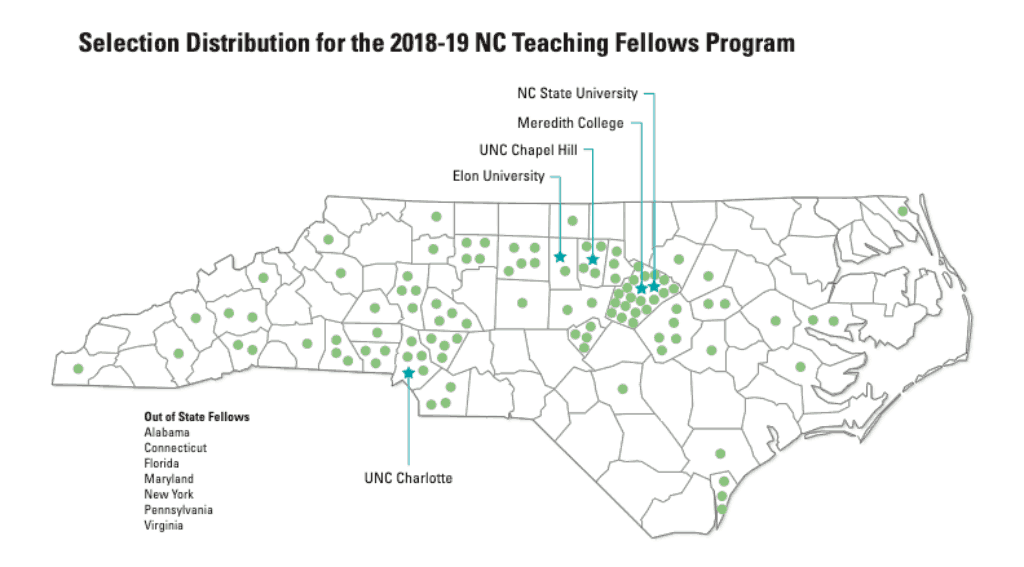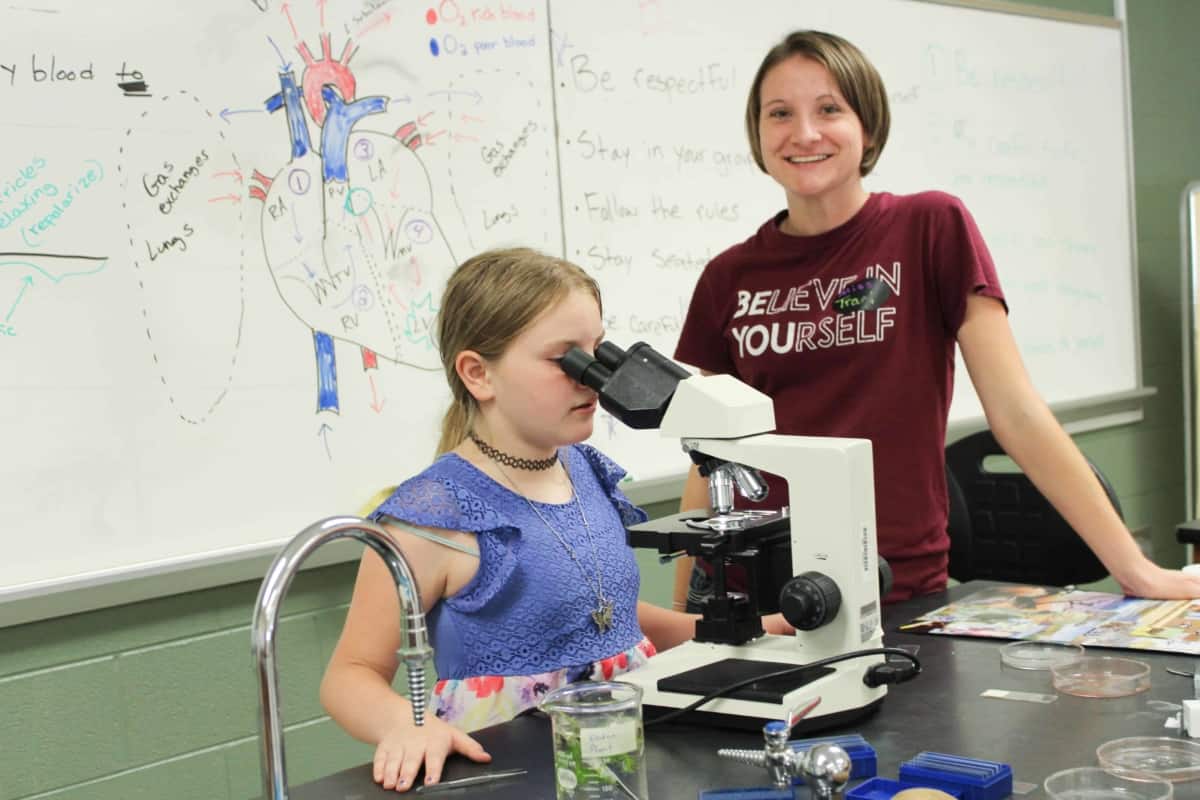Last month, we examined STEM teacher success on Praxis qualifying examinations, which are proxy measures for teacher quality for beginning teachers. To dive into more of our STEM ScoreCard topics, take a look here.
Strategic investments and innovations are essential for developing teacher quality, PK-12 student achievement, and more broadly for promoting STEM literacy in North Carolina. This and following editions of the NC STEM ScoreCard will focus on specific programs supported by public and private dollars that are strategic investments to increase the numbers, quality, and impact of STEM teachers in North Carolina. One of those investments is in the newly revised North Carolina Teaching Fellows Program.
The goal of the NC STEM ScoreCard is to build STEM knowledge and skills capacity in schools, students, teachers, and in communities across urban and rural North Carolina.
Three key questions framing this goal are:
- In what ways does the state directly invest in programming and innovations that promote STEM learning?
- In what ways are significant philanthropies and other organizations supporting STEM education and learning in North Carolina?
- What measurable impacts is North Carolina realizing from its strategic investments?
The NC Teaching Fellows Program
In 2011, the North Carolina General Assembly voted to end the North Carolina Teaching Fellows Program, an innovative, first-of-a kind teacher recruitment and preparation program that other states had replicated. The last students from the former program graduated in the spring of 2015. However, many educators, business leaders, politicians, and other citizens called for the program to be reinstituted.
In 2017, the General Assembly partially restored the North Carolina Teaching Fellows and appointed a commission to oversee the creation of the new program. Based on legislative criteria and an applications process passed into law by the state legislature the commission selected five partner schools — Elon University, Meredith College, NC State, UNC Chapel Hill, and UNC Charlotte — to create a retooled Teaching Fellows program aimed at supporting students preparing for a teaching career in the fields of science, technology, engineering, mathematics, or special education.
Under the former program, students could select from teacher preparation programs in 17 public and private institutions across the state and received annual forgivable loans of up to $6,500 per year. Students selected for one of the new programs receive up to $8,250 per year in forgivable loans if they commit to teach in a STEM or a special education area in North Carolina.
In the new Teaching Fellows Program, graduates who become certified teachers in North Carolina have 10 years to pay back the loan, either through cash repayment or loan forgiveness. In order to meet the loan forgiveness requirement, a teacher is required to serve one year in a low-performing school or two years in another public school for every year they were awarded a forgivable loan. Teachers who elect to work in public charter schools and the new University of North Carolina laboratory schools are eligible for the loan forgiveness.
2018-19: The inaugural class of the reconstituted NC Teaching Fellows Program
On April 1, 2018, Commission Chair Mary Ann Danowitz, dean of the NC State College of Education, announced the commission’s selection for the 2018-19 class of North Carolina Teaching Fellows. The first class of 110 Teaching Fellows came from 42 counties across North Carolina, plus seven students from other states. The distribution of those selected and the NC Teaching Fellows preparation institutions are shown in the graphic below.
The selection process drew students from the mountains to the coast. It is evident that the commission and five program institutions made good-faith efforts to recruit a diverse body of students from across North Carolina and beyond.
The selection of the 2018-19 Fellows reflects a well-known phenomenon about teacher preparation recruitment and selection — that it is most often a more localized process than the general demographics of the university. Thus, we see a greater concentration of NC Teaching Fellows clustered in the geographic proximity of the five offering institutions. This reflects the preferences of the candidates, not the bias of those making the selections. (The Piedmont counties are also the most populous in the state.)
2018-19 NC Teaching Fellows
The data below reflects the first class of Teaching Fellows after the first full year of program implementation in 2018-19. Note: Percentages have been rounded. Second year data will be available on release of the second annual report of the Teaching Fellows Commission on January 1, 2020.
Demographic information
Table I: Teaching fellows by gender
|
Gender |
Number |
Percentage |
|
Male |
13 |
18% |
|
Female |
61 |
82% |
Table II: Teaching fellows by race
|
Race |
Number |
Percentage |
|
African American |
4 |
5% |
|
American Indian/Alaska Native |
1 |
2% |
|
Asian/Pacific Islander |
4 |
5% |
|
Hispanic/Latino |
4 |
5% |
|
White/Caucasian |
61 |
82% |
Program and licensure area information
Table III: Teaching Fellows by institution
|
Higher Education Institution |
Number |
Percentage |
|
Elon University |
8 |
11% |
|
Meredith College |
7 |
9% |
|
North Carolina State University |
25 |
34% |
|
UNC Chapel Hill |
15 |
20% |
|
UNC Charlotte |
19 |
26% |
Table IV: Teaching Fellows by intended licensure area
|
Area of Licensure |
Number |
Percentage |
|
STEM |
53 |
72% |
|
Special Education |
21 |
28% |
NC Teaching Fellows institutional contact information
|
Higher Education Institution |
Contact Person |
e-Mail address |
|
Elon University |
Jeff Carpenter |
Jcarpenter13@elon.edu |
|
Meredith College |
CeCe Toole |
toolecec@meredith.edu |
|
NC State University |
Crystal Espey |
cnespey@ncsu.edu |
|
UNC Chapel Hill |
Jennifer Diliberto |
jdil@email.unc.edu |
|
UNC Charlotte |
Heather Coffey |
hcoffey@uncc.edu |
More detailed information about the NCTF program can be accessed here.
Questions for maximizing this strategic investment in STEM teacher quality
- Given that teacher education students often reflect a more local “economy” than the general demographics of the college or university, should the General Assembly consider expansion of the NC Teaching Fellows program to institutions in the eastern and western regions of the state?
- Racial and gender diversity in the teaching profession in North Carolina do not reflect the demographics of the state (nor does it in any other state in the United States). How might additional incentives and/or creative strategies be field tested in the NC Teaching Fellows program to attract more diverse teacher candidates?
- What evidence of impact must be generated over time by the programs and completers of the NC Teaching Fellows Program to provide confidence to the public and to the General Assembly of the value of this strategic investment?



